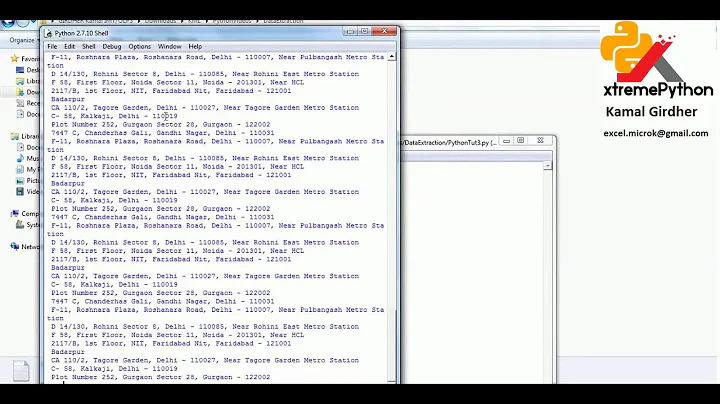Extracting IP address from a text and store it in a variable
Solution 1
You almost had it right the first time. The awk answer is good for your specific case, but the reason you were receiving an error is because you were trying to use grep as if it were searching for a file instead of a variable.
Also, when using regular expressions, I always use grep -E just to be safe. I have also heard that backticks are deprecated and should be replaced with $().
The correct way to grep a variable with on shells that support herestrings is using input redirection with 3 of these guys: <, so your grep command ($ip variable) should actually read as follows:
ip="$(grep -oE '[0-9]{1,3}\.[0-9]{1,3}\.[0-9]{1,3}\.[0-9]{1,3}' <<< "$line")"
If it is a file you are searching, I always use a while loop, since it is guaranteed to go line-by-line, whereas for loops often get thrown off if there is any weird spacing. You are also implementing a useless use of cat which could be replace by input redirection as well. Try this:
while read line; do
ip="$(grep -oE '[0-9]{1,3}\.[0-9]{1,3}\.[0-9]{1,3}\.[0-9]{1,3}' <<< "$line")"
echo "$ip"
done < "abd"
Also, I don't know what OS or version of grep you are using, but the escape character you had before the curly braces is usually not required whenever I have used this command in the past. It could be from using grep -E or because I use it in quotes and without backticks -- I don't know. You can try it with or without and just see what happens.
Whether you use a for loop or a while loop, that is based on which one works for you in your specific situation and if execution time is of utmost importance. It doesn't appear to me as if OP is trying to assign separate variables to each IP address, but that he wants to assign a variable to each IP address within the line so that he can use it within the loop itself -- in which case he only needs a single $ip variable per iteration. I'm sticking to my guns on this one.
Solution 2
If the IP address is always the second field of that file, you can use awk or cut to extract it.
awk '{print $2}' abd
or
cut -d' ' -f2 abd
If you need to iterate through the IP addresses, the usual for or while loops can be used. For example:
for ip in $(cut -d' ' -f2 abd) ; do ... ; done
or
awk '{print $2}' abd | while read ip ; do ... ; done
Or you can read all the IP addresses into an array:
$ IPAddresses=($(awk '{print $2}' abd))
$ echo "${IPAddresses[@]}"
128.206.6.136 128.206.6.137 23.234.22.106
Solution 3
grep searches files or standard input for the patterns. You cannot pass data strings to match on the grep command line. Try this:
grep -o '[0-9]\{1,3\}\.[0-9]\{1,3\}\.[0-9]\{1,3\}\.[0-9]\{1,3\}' abd
If you need to get each IP address in a variable:
grep -o '[0-9]\{1,3\}\.[0-9]\{1,3\}\.[0-9]\{1,3\}\.[0-9]\{1,3\}' abd |
while read IP
do
echo "$IP"
done
Comparative Performance Testing of the accepted answer
The answer recommends executing a separate invocation of grep on each line of the input file. Let's see how that works out with files of 1000 to 5000 lines. The files abd.1000 and abd.5000 were created by simply replicating the original example file in the question. The original code was changed only to take the filename as a command line argument (${1:?}) instead of the hardcoded "abd".
$ wc -l abd.1000 abd.5000
1000 abd.1000
5000 abd.5000
6000 total
Test the example code in this answer on a 1000 line file:
$ cat ip-example.sh
#!/bin/sh
grep -o '[0-9]\{1,3\}\.[0-9]\{1,3\}\.[0-9]\{1,3\}\.[0-9]\{1,3\}' "${1:?}" |
while read IP
do
echo "$IP"
done
$ time sh ip-example.sh abd.1000 > /dev/null
real 0m0.021s
user 0m0.007s
sys 0m0.017s
$
The above shows that the example in this answer processed a 1000 line file in less than 1/4 second. Now let's see how the example in the accepted answer performs:
$ cat accepted.sh
#!/bin/bash
while read line; do
ip="$(grep -oE '[0-9]{1,3}\.[0-9]{1,3}\.[0-9]{1,3}\.[0-9]{1,3}' <<< "$line")"
echo "$ip"
done < "${1:?}"
$ time bash accepted.sh abd.1000 > /dev/null
real 0m3.565s
user 0m0.739s
sys 0m2.936s
$
Hmmm. The example in the accepted answer executes in 3 1/2 seconds, about 169 times slower than the 1/40 second in example for this answer.
Let's up the ante and test with 5000 lines:
$ time sh ip-example.sh abd.5000 > /dev/null
real 0m0.052s
user 0m0.051s
sys 0m0.029s
About twice as long to process 5 times more data.
$ time bash accepted.sh abd.5000 > /dev/null
real 0m17.561s
user 0m3.817s
sys 0m14.333s
The example code in the accepted answer takes almost 5 times as long to process 5 times more data than to process 1000 lines of data.
Conclusions
The example in the accepted answer takes 337 times longer to process a 5000 line file than the ip-example.sh code in this answer (the other answers on this page should perform similarly to ip-example.h).
Solution 4
I suggest you use AWK for that purpose. It's much more appropriate tool for processing columns.
xieerqi:$ vi ipAddresses
xieerqi:$ awk '{printf $2" "}' ipAddresses
128.206.6.136 128.206.6.137 23.234.22.106
xieerqi:$ ARRAY=($(awk '{printf $2" "}' ipAddresses))
xieerqi:$ echo ${ARRAY[@]}
128.206.6.136 128.206.6.137 23.234.22.106
xieerqi:$ echo ${ARRAY[1]} ${ARRAY[2]}
128.206.6.137 23.234.22.106
xieerqi:$ cat ipAddresses
48878 128.206.6.136
34782 128.206.6.137
12817 23.234.22.106
Solution 5
See the first question in the Bash FAQ:
while read -r _ ip; do printf "%s\n" "${ip[@]}"; done < abd
128.206.6.136
128.206.6.137
23.234.22.106
Related videos on Youtube
Swatesh Pakhare
Updated on September 18, 2022Comments
-
Swatesh Pakhare over 1 year
I have a text file named abd shown below.
48878 128.206.6.136 34782 128.206.6.137 12817 23.234.22.106I want to extract only IP address from the text and store it in a variable and use for other purpose.
I have tried this.
for line in `cat abd` do ip=`grep -o '[0-9]\{1,3\}\.[0-9]\{1,3\}\.[0-9]\{1,3\}\.[0-9]\{1,3\}' $line` echo $ip doneI am getting an error as follows
grep: 34782: No such file or directory grep: 128.206.6.137: No such file or directory grep: 12817: No such file or directory grep: 23.234.22.106: No such file or directoryI don't know what is going wrong here. Any help would be appreciated.
-
 Admin over 8 yearsWill the input file follow the same pattern?
Admin over 8 yearsWill the input file follow the same pattern? -
 Admin over 8 years@heemayl Yes. There are loads of other IPs.
Admin over 8 years@heemayl Yes. There are loads of other IPs. -
 Admin over 8 yearsChange the first line of your loop to
Admin over 8 yearsChange the first line of your loop towhile read lineand add< abdafter thedone -
 Admin over 8 yearsIf there are tons of other IPs, then I think my answer best answers what it appeared as if you were actually trying to do, despite other users' negative votes and comments toward my answer. Can you clarify your question? Are you wanting to go through each IP in order and say something about it or do something with it, or are you going to reference each IP individually with a separate variable? If you are wanting to go in order (within the loop) you only need a single
Admin over 8 yearsIf there are tons of other IPs, then I think my answer best answers what it appeared as if you were actually trying to do, despite other users' negative votes and comments toward my answer. Can you clarify your question? Are you wanting to go through each IP in order and say something about it or do something with it, or are you going to reference each IP individually with a separate variable? If you are wanting to go in order (within the loop) you only need a single$ipvariable per iteration, and there is no need for an array or to reference a specific IP address outside the loop.
-
-
Swatesh Pakhare over 8 yearsYaa man it worked. Thank you. Appreciated.
-
 rubynorails over 8 yearsYou can absolutely pass strings (and variables) to
rubynorails over 8 yearsYou can absolutely pass strings (and variables) togrepby using<<<input redirection. -
Swatesh Pakhare over 8 yearsCan you explain me the second line of the code? What does that $ before grep means?
-
 rubynorails over 8 years@SwateshPakhare It is basically the same thing as the backticks. It sets the
rubynorails over 8 years@SwateshPakhare It is basically the same thing as the backticks. It sets the$ipvariable to the output of the command inside$(). You could actually even sayecho "$(grep -oE '[0-9]{1,3}\.[0-9]{1,3}\.[0-9]{1,3}\.[0-9]{1,3}' <<< "$line")"instead of setting it as a variable beforehand. -
 RobertL over 8 years
RobertL over 8 years<<<is a shell extension and won't work under many shells, for example Debian based systems, unless the script is run bybashorzshor etc. The default system shell on these systems is POSIX compliant and does not recognize<<<. -
 RobertL over 8 yearsThe loop in this answer executes a separate
RobertL over 8 yearsThe loop in this answer executes a separategrepprocess for each line of the input file. Even with files of moderate size this loop will take seconds, instead of fractions of seconds, to execute. The larger the file the bigger the performance hit. -
Rui F Ribeiro over 8 yearsI second the awk, seems much more intuitive in Unix
-
 rubynorails over 8 years@RobertL No, it's actually the only way unless you
rubynorails over 8 years@RobertL No, it's actually the only way unless youechothe string or variable and then pipe it togrep. So with it being the only way to grep it directly, then I would say that would, at least by most people, be considered the correct way. And by the way, I use<<<on Debian-based systems all the time. Most default shells these days are Bash. -
 rubynorails over 8 years@RobertL I meant it was the only way to
rubynorails over 8 years@RobertL I meant it was the only way togrepa string or variable, not the only way to solve the problem. You specifically stated thatgrephad to be executed on a file, which is absolutely false. Also, nowadays, /bin/sh is usually just a symlink to Bash in order to maintain compatibility since Bash can do every SH can do, plus so much more. There is no reason to run SH. It has been updated, outdated, and deprecated for years. If someone has a question about SH, they should specify that, and I will tailor my answers to fit their needs. Otherwise, my answers will default to Bash. -
 rubynorails over 8 yearsI feel like I should also comment on this answer since it has been updated to call me out. Let me once more state, that I never said to know the "true way of Unix" or that "my answer was the only correct way." @RobertL is twisting my words because I called him out on the fact that it is actually possible to
rubynorails over 8 yearsI feel like I should also comment on this answer since it has been updated to call me out. Let me once more state, that I never said to know the "true way of Unix" or that "my answer was the only correct way." @RobertL is twisting my words because I called him out on the fact that it is actually possible togrepa variable. I already said the awk solution posed by cas is the best answer to assign a different variable to each IP address. The only thing I defined as "correct" and "the only way" are the 2 different ways of grepping a string or variable, which @RobertL said was not possible. -
 mikeserv over 8 yearsthough i think it is pretty funny, pointing out the hurt butts probably isn't making you a lot of friends, either.
mikeserv over 8 yearsthough i think it is pretty funny, pointing out the hurt butts probably isn't making you a lot of friends, either. -
 terdon over 8 yearsDon't use answers to take potshots at another user. If you must, take it to chat.
terdon over 8 yearsDon't use answers to take potshots at another user. If you must, take it to chat. -
 terdon over 8 yearsDon't use answers to take potshots at another user. If you must, take it to chat. @RobertL follow your own advice. Keep your answers technical and be nice.
terdon over 8 yearsDon't use answers to take potshots at another user. If you must, take it to chat. @RobertL follow your own advice. Keep your answers technical and be nice. -
Alessio over 8 yearsbash behaves differently when called as
/bin/sh. It runs in--posixmode and disables all non-POSIX extensions. -
Alessio over 6 yearsEverything you say about the relative performance is correct, except that it's at least 10 times worse than you say (and 0.021 seconds is not only less than 1/4 second, it's less than 1/40th of a second). The first example shows that running the grep in the loop is 169 times slower, not 7-8 times (3.565 / 0.21 = 169.76), while the second shows that the loop is 337 times slower, not 34 times (17.561 / 0.052 = 337.71)






